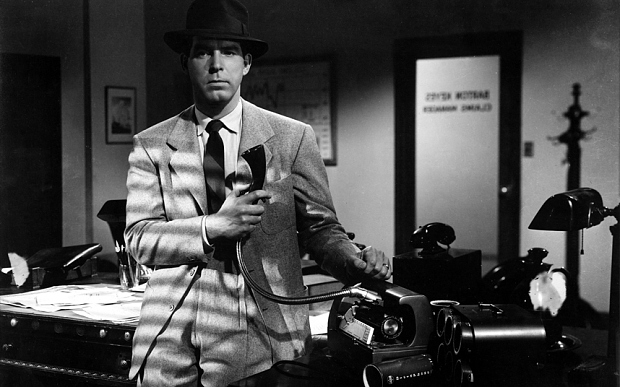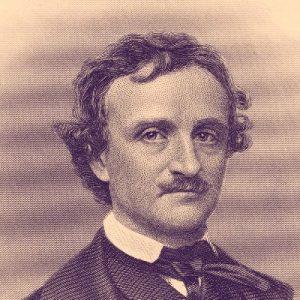Otto Penzler ranks, analyzes, & celebrates the 106 greatest crime films of all-time. Catch up on the series and find new installments daily here.
__________________________________
Double Indemnity (1944)
__________________________________
TYPE OF FILM: Noir
STUDIO: Paramount
PRODUCER: Joseph Sistrom
DIRECTOR: Billy Wilder
SCREENWRITERS: Billy Wilder and Raymond Chandler
SOURCE: Double Indemnity, novella by James M. Cain
RUNNING TIME: 107 minutes
PRINCIPAL PLAYERS:
Barbara Stanwyck………………………………………………………………Phyllis Dietrichson
Fred MacMurray………………………………………………………………………..Walter Neff
Edward G. Robinson………………………………………………………………….Barton Keyes
Porter Hall……………………………………………………………………………..Mr. Jackson
Jean Heather………………………………………………………………………Lola Dietrichson
Tom Powers…………………………………………………………………….….Mr. Dietrichson
Byron Barr……………………………………………………………………….…..Nino Zachette
Richard Gaines……………………………………………………………………….…Mr. Norton
__________________________________
DID YOU KNOW?
__________________________________
Billy Wilder, the director, cowriter, and driving force in bringing James M. Cain’s novella to the screen, had a terrible time getting people to work with him on it. His usual collaborator on screenplays, Charles Brackett, reportedly found the story so repugnant that he refused to have anything to do with it. Barbara Stanwyck agreed to star because she wanted to broaden her image from the usual “good girl” roles she’d had, but virtually every male lead walked away from the project, including George Raft, who made a career of walking away from one great film after another (The Maltese Falcon and Casablanca, to name two, had both been offered to him). Finally, Fred MacMurray, who had previously played in numerous and varied films, including light comedies, took the role that made him a bigger star.
__________________________________
THE STORY
__________________________________

Insurance salesman Walter Neff calls on a policyholder, Mr. Dietrichson, to sell him a life-insurance policy, only to run into his young wife. He is instantly drawn to her, and they engage in sexual double entendre conversation that makes it clear they are attracted to each other. Phyllis Dietrichson convinces Neff that they could be married if Dietrichson had a fatal accident, which would pay her double the $50,000 indemnity on the insurance policy. After they plot to murder her husband, Neff conceives the plan that will make the crime look like an accident and then carries it out. Barton Keyes, an investigator at Neff’s insurance company, is assigned to look into the case and becomes convinced that Dietrichson was murdered. As Keyes moves closer and closer to a solution, Neff realizes that Phyllis had used him only to get the money, and he plans to kill her. When the confrontation between the two takes place, she beats him to the punch and shoots him once but, realizing that she truly does love him, she can’t finish him off. Neff then shoots her twice, killing her. Having confessed the entire story to Keyes on a recording, Neff dies of his wounds.
***
This hugely important film not only defined the noir genre, it was a milestone for Hollywood motion pictures in general. For the first time, audiences saw a murder planned and carried out as the two protagonists risked everything for greed and lust. The whopping sum of $25,000 had been paid to Cain for the novella, which had run in Liberty magazine, even though the Production Code Administration, Hollywood’s censoring body, had warned that it would never get on the screen.
Wilder brought in Raymond Chandler, who had never before written a screenplay, to turn the amoral Cain story into a screenplay. Changing the overt sex into innuendo turned the trick and it was filmed.
Wilder and Chandler took an instant dislike to each other while working on the film. Chandler was quiet and dignified, reticent and shy, and married to a woman twenty years older than he (he was twenty-five at the time). Wilder was loud, arrogant, uncouth, and dated several beautiful young women at the same time. But Chandler learned from Wilder how to write a screenplay (getting two Oscar nominations within four years), and Wilder recognized the extraordinary talent of an author whose work had mainly been published in pulp magazines.
Oscar nominations went to the film for Best Picture, Billy Wilder for Best Director, Barbara Stanwyck for Best Actress, and Raymond Chandler for Best Screenplay. All lost.
The original ending had Neff going to the gas chamber and showed his execution in full detail. Wilder decided this scene was not necessary.
A television version of Double Indemnity was produced in 1973, adapted by Steven Bochco and starring Samantha Eggar, Richard Crenna, and Lee J. Cobb.
__________________________________
BEST LINE
__________________________________
Neff has just met the sexy and scantily clad wife of the man to whom he’s selling a large life insurance policy. The man’s not in, so she suggests that he return to speak to her husband. “Mr. Neff, why don’t you drop by tomorrow evening around eight-thirty. He’ll be in then.” “Who?” Neff asks. “My husband,” she replies. “You were anxious to talk to him, weren’t you?” “Yeah, I was,” Neff responds, “but I’m sort of getting over the idea, if you know what I mean.”





















